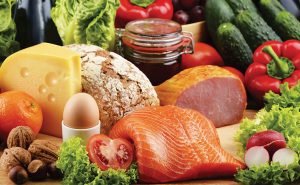Metabolism: The Sure Ways To Boost It

Metabolism includes all the things our body does to turn food into energy. But, all people do not have same type of metabolism power. Some people have a faster metabolism than others.
Some things actually decide whether our metabolism will be speedy or sluggish. There are some factors like our age, sex, and genes that affect our metabolism but we cannot control them. At the same time, there are some other factors like sluggish thyroid that decrease our metabolism. But with some care we can beat these factors and boost our metabolism:
Eat plenty of protein

Eating food can increase your metabolism for a few hours. This is called the thermic effect of food (TEF). It is caused by the extra calories required to digest, absorb and process the nutrients in your meal. Protein causes the largest rise in TEF. It increases your metabolic rate by 15-30%, compared to 5-10% for carbs and 0-3% for fats. Eating protein has also been shown to help you feel fuller and prevent you from overeating. One study found that people were likely to eat around 441 fewer calories per day when protein made up 30% of their diet. Eating more protein can also reduce the drop in metabolism often associated with losing fat. This is because it reduces muscle loss, which is a common side-effect of dieting.
Drink more cold water

People who drink water instead of sugary drinks are more successful at losing weight and keeping it off. This is because sugary drinks contain calories, so replacing them with water automatically reduces your calorie intake. However, drinking water may also temporarily speed up your metabolism. Studies have shown that drinking 0.5 liters of water increases resting metabolism by 10–30% for about an hour. This calorie-burning effect may be even greater if you drink cold water, as your body uses energy to heat it up to body temperature. Water can also help fill you up. Studies show that drinking water a half an hour before you eat can help you eat less.
Do workout
High-intensity interval training (HIIT) involves quick and very intense bursts of activity. It can help you burn more fat by increasing your metabolic rate, even after your workout has finished. This effect is believed to be greater for HIIT than for other types of exercise. HIIT has also been shown to help you burn fat. One study in overweight young men found that 12 weeks of high-intensity exercise reduced fat mass by 4.4 pounds (2 kg) and belly fat by 17%.
Lift heavy things

Muscle is more metabolically active than fat, and building muscle can help increase your metabolism. This means you will burn more calories each day, even at rest. Lifting weights will also help you retain muscle and combat the drop in metabolism that can occur during weight loss. In one study, 48 overweight women were placed on a diet of 800 calories per day, along with no exercise, aerobic exercise or resistance training. After the diet, the women who did the resistance training maintained their muscle mass, metabolism and strength. The others not only lost weight, but also lost muscle mass and experienced a decrease in metabolism.
Stand up more
Sitting too much is bad for your health. This is partly because long periods of sitting burn fewer calories and can lead to weight gain. In fact, compared to sitting, an afternoon of standing up at work can burn an extra 174 calories. If you have a desk job, try standing up for short periods to break up the length of time you spend sitting down.
Get a good sleep

Lack of sleep is linked to obesity. This may partly be caused by the negative effects of sleep deprivation on metabolism. Lack of sleep has also been linked to increased blood sugar levels and insulin resistance, which are both linked to a higher risk of developing type-2 diabetes. It is also been shown to boost the hunger hormone ghrelin and decrease the fullness hormone leptin. This could explain why many people who are sleep-deprived feel hungry and struggle to lose weight.
Tags :

- Last News
- More Read
- How celebrity endorsement is being used to dupe us 4 years ago
- Begging: The pull and push factors 4 years ago
- 4 reasons to travel around by a cycle 4 years ago
- Sumptuous soup to maintain your health 4 years ago
- Why so many educated youths are unemployed? 4 years ago
- When you are doing a sedentary job 4 years ago
- Unique ideas to decorate your office desk 4 years ago
- Lips: Making it bold & beautiful 4 years ago
- Masks you must have in your closet 4 years ago
- Of Congestion and exasperation 4 years ago
- Dishes to try out this Eid 1935
- Winter hacks: A quick guide 1923
- Makeup Game: Give It An Arabian Twist 1773
- Of Patriotism And Fashion 1755
- Parties: What To Take Into Account 1675
- Desi designers you should have an eye on 1649
- Luscious Cheese Kunafa 1589
- A tour around Bangabandhu Safari Park 1472
- Masks you must have in your closet 1452
- Small Budget, Big Makeover 1435
Copyright ©2019, All Rights Reserved. Development by: webnewsdesign.com












